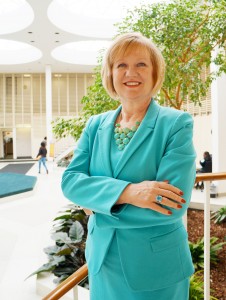The healthcare environment is undergoing a much-needed change toward something that emphasizes prevention and community.
Adelphi Previews Three-Day Workshop on Care Coordination
Introduction to Care Coordination, the College of Nursing and Public Health’s three-day workshop—due January 19–21, 2016—is aimed at registered nurses interested in or new to this rapidly growing healthcare model.
Setting the stage for the workshop, Elaine Smith ’78, Ed.D., associate dean for operations at the College of Nursing and Public Health, said, “Care coordination is an interprofessional approach to care and involves other disciplines, such as social work. In particular,” she added, “the care coordinator position is an expanding field of specialization for registered professional nurses. Recognizing this trend, our care coordination workshop is designed to provide practicing nurses with the knowledge and skill to function in these roles.”
Dr. Smith, who will open the proceedings January 19 with an overview of the workshop’s agenda, pointed out, “The healthcare environment is undergoing a dramatic and much-needed change” as it moves toward a system that “places greater emphasis on community-based, prevention-focused care and relies less on acute hospital-based care.”
In a day-one session entitled “Changes in Healthcare System and Care Coordination Implications,” Patrick R. Coonan ’78, Ed.D., the College’s dean, will talk about patient safety, information technology, population health trends and legal and regulatory influences.
He will be followed by Deborah Ambrosio-Mawhirter, Ed.D., chair of the College’s Department of Nursing Foundations, who will discuss “Care Coordination: Definitions and Models.” Her afternoon session will explore “Care Coordination Roles.”
Workforce development will be key, given the major shift in how and where care is delivered to patients. “A broad set of skills and competencies is needed in the areas of care coordination and care management to assure smooth transitions as patients move from one level of care to the next,” Dr. Smith explained. “A focus on care coordination in both academic health professions’ programs and continuing professional development activities is required to create a robust workforce prepared to fulfill the requirements of this new model of care.”
In a day-two session entitled “Best Practice Model in Action,” Julie Mirkin, New York-Presbyterian Health Care System’s vice president of care coordination, will address organization of care coordination departments, care coordinator qualifications and the like.
A “Patient-Centered Care Planning” panel will feature Paula Rudorfer, case manager at North Shore University Hospital, Manhasset, New York; Marie Cox, D.N.P.; and Susan Zori, D.N.P. They will touch on elements of a comprehensive needs assessment, including at-risk patient identification assessment tools and identification of gaps in care. Dr. Cox and Dr. Zori are College faculty members.
These same panelists will then return for an afternoon session continuing the “Patient-Centered Care Planning” topic but zeroing in on motivational interviewing, medication reconciliation and elements of a comprehensive plan of care.
The closing day will start with “A Day in the Life of a Care Coordinator,” featuring Rudorfer. She will talk about the case-finding and case-planning process, referrals, among other topics.
During the two final afternoon sessions, Charles Cal ’95, M.S. ’01, M.B.A. ’03, clinical assistant professor at the College, will discuss “Evaluation of Care Coordination Programs” and also “Ongoing Professional Competency.” The latter will focus on care management professional organizations, certification and job opportunities.
For further information, please contact:
College of Nursing and Public Health
Nexus Building, 3rd Floor
p – 516.877.4510
